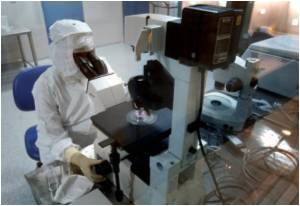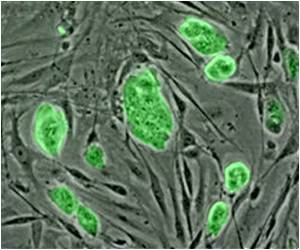Synthetic version of a protein amplifies genes needed for the generation and maintenance of stem cells, say researchers.

Scientists, whose work is published in the journal Cell Reports, were able to overcome this by producing a synthetic version of Oct4 that amplified the effect of the protein in its natural form. The synthetic version of Oct4 was much more efficient in turning on genes that instruct cells on how to be stem cells and, as a result, the cells did not need as much Oct4 for either reprogramming or to remain as stem cells – thereby eliminating problems caused by too much Oct4.In fact, the synthetic Oct4 could support stem cells under conditions that they do not normally grow. These findings could also help scientists find new ways generate stem cells in the laboratory.The study showed that Oct4 was mainly responsible for turning on genes that instruct cells on how to become stem cells, rather than turning off genes that encourage the cells to differentiate.
"Our discovery is an important step towards generating and maintaining stem cells much more effectively," says Professor Joshua Brickman, affiliated with both The Danish Stem Cell Center (DanStem), University of Copenhagen and Medical Research Council Centre for Regenerative Medicine at the University of Edinburgh. "Embryonic stem cells are characterized, among other things, by their ability to perpetuate themselves indefinitely and differentiate into all the cell types in the body – a trait called pluripotency. But to be able to use them medically, we need to be able to maintain them in a pure state, until they're needed. When we want to turn a stem cell into a specific cell, such as insulin producing beta cell, or a nerve cell in the brain, we'd like this process to occur accurately and efficiently.
This will not be possible if we don't understand how to maintain stem cells as stem cells. As well as maintaining embryonic stem cells in their pure state more effectively, the artificially created Oct4 was also more effective at reprogramming adult cells into so-called induced Pluripotent Stem cells, which have many of the same traits and characteristics as embryonic stem cells but can derived from the patients to both help study degenerative disease and eventually treat them.." Oct4 is a so-called transcription factor – a protein that binds to specific DNA sequences, thereby controlling the flow (or transcription) of genetic information from DNA to mRNA. The synthetic version of Oct4 was created by using recombinant DNA technology whereby a gene was modified to produce new and more active protein. The modified gene was either introduced into stem cells or used to reprogram adult skin cells. If scientists can exploit this programming of stem cell programs, it will improve the ability to generate stem cells directly from a patient. These cells could in turn potentially be used for individualised studies and for developing individualized therapies for degenerative diseases such as type 1 diabetes and neuro-degenerative diseases.
Source-Eurekalert













